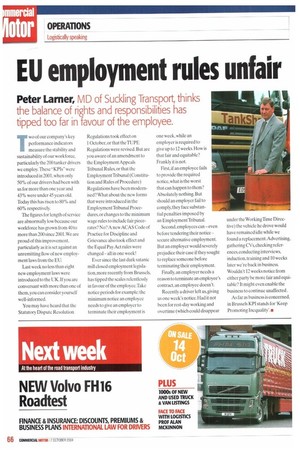EU employment rules unfair
Page 66

If you've noticed an error in this article please click here to report it so we can fix it.
Peter Lamer, MD of Suckling Transport, thinks the balance of rights and responsibilities has tipped too far in favour of the employee.
Two of our company's key performance indicators measure the stability and sustainability of our workforce, particularly the 200 tanker drivers we employ. These "KPIs" were introduced in 2001, when only 50% of our drivers had been with us for more than one year and 43% were under 45 years old. Today this has risen to 80% and 60% respectively.
The figures for length of service are abnormally low because our workforce has grown from 4010 more than 200 since 2001.We are proud of this improvement, particularly as it is set against an unremitting flow of new employment laws from the EU.
Last week no less than eight new employment laws were introduced to the UK. If you are conversant with more than one of them, you can consider yourself well-informed.
You may have heard that the Statutory Dispute Resolution Regulations took effect on 1 October, or that the TUPE Regulations were revised. But are you aware of an amendment to the Employment Appeals Tribunal Rules, or that the Employment Tribunal (Constitution and Rules of Procedure) Regulations have been modernised? What about the new forms that were introduced in the Employment Tribunal Procedures, or changes to the minimum wage rules to include fair piecerates? No? A new ACAS Code of Practice for Discipline and Grievance also took effect and the Equal Pay Act rules were changed—all in one week!
Ever since the last dark satanic mill closed employment legislation,more recently from Brussels, has tipped the scales relentlessly in favour of the employee.Take notice periods for example:the minimum notice an employee needs to give an employer to terminate their employment is one week, while an employer is required to give up to 12 weeks. How is that fair and equitable? Frankly it is not.
First, if an employee fails to provide the required notice, what is the worst that can happen to them? Absolutely nothing. But should an employer fail to comply, they face substantial penalties imposed by an Employment Tribunal.
Second, employees can— even before tendering their notice — secure alternative employment. But an employer would severely prejudice their case if they sought to replace someone before terminating their employment.
Finally, an employer needs a reason to terminate an employee's contract, an employee doesn't.
Recently a driver left us, giving us one week's notice. Had it not been for rest-day working and overtime (which could disappear under the WorkingTime Directive) the vehicle he drove would have remained idle while we found a replacement, Advertising, gathering CVs, checking references, conducting interviews, induction.training and 10 weeks later we're back in business. Wouldn't 12 weeks notice from either party be more fair and equitable? It might even enable the business to continue unaffected.
As far as business is concerned, in Brussels KPI stands for 'Keep Promoting Inequality'.•






























































































































































































